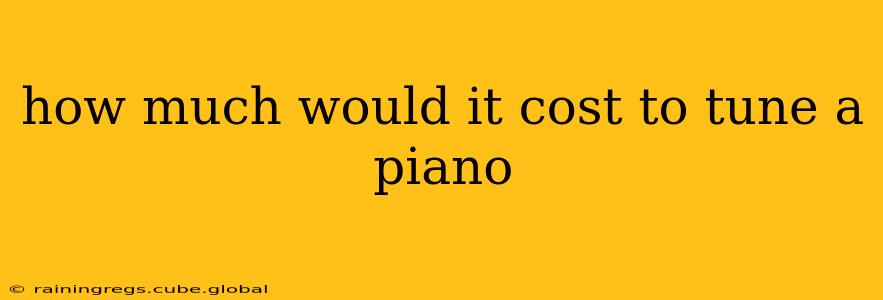How Much Does it Cost to Tune a Piano?
The cost of tuning a piano varies significantly depending on several factors. While a quick online search might give you a range, understanding these influencing factors will help you get a more accurate estimate and avoid surprises. This guide will break down the cost, exploring common questions and providing insights for informed decision-making.
What factors influence piano tuning costs?
Several key factors determine the final price you'll pay for a piano tuning:
- Your Location: Tuning costs differ geographically. Urban areas often command higher prices than rural communities due to higher operating costs for tuners.
- Type of Piano: Tuning an upright piano generally costs less than tuning a grand piano. Grand pianos are more complex and require more time and expertise.
- Condition of the Piano: A piano that's severely out of tune or hasn't been tuned in years might require more time and effort, potentially increasing the cost. Significant repairs, like replacing broken strings, are separate from tuning and significantly increase the overall expense.
- Tuner's Experience and Reputation: Experienced and highly-rated piano tuners often charge more than those with less experience. Their expertise and reputation justify the higher cost. A well-regarded tuner is worth the investment, ensuring a higher quality tuning.
- Number of Tunings Needed: Some pianos might require multiple tunings to achieve the desired level of accuracy, especially if they've been neglected for a long time.
How often should I tune my piano?
Ideally, a piano should be tuned at least once a year, especially if it's played regularly. However, new pianos or pianos in consistently stable environments might only need tuning every 18 months. Climate changes and frequent playing will affect tuning stability. If you notice your piano is significantly out of tune, it's time to schedule a professional tuning.
What is included in a typical piano tuning?
A standard piano tuning includes:
- Pitch Raising: Adjusting the tension of the strings to bring the piano to the correct pitch (A4 = 440 Hz).
- Fine Tuning: Making precise adjustments to ensure all notes are in harmony.
- Regulation (Sometimes Included): This addresses the mechanism that enables the keys to play accurately. While sometimes included, regulation is often a separate service that costs extra.
- Inspection: A visual inspection of the piano's condition, potentially identifying any issues that require attention.
What are the common price ranges for piano tuning?
While prices vary widely, here's a general idea of what you can expect in different areas:
- Upright Piano: $100-$250 per tuning
- Grand Piano: $150-$400 per tuning or more, depending on size.
These prices are estimates and can be higher or lower. Always get a quote from a local tuner.
What should I do if I find a tuner that seems unusually cheap or expensive?
A price significantly lower than the average might indicate a lack of experience or quality. On the other hand, exceptionally high prices might reflect inflated pricing or unnecessary services. It's essential to compare quotes from several reputable tuners in your area before making a decision. Always ask about the tuner's experience and what's included in the price.
Remember to obtain quotes from several reputable tuners before making a decision. A well-tuned piano enhances playing enjoyment and preserves the instrument's value, making the investment worthwhile.
